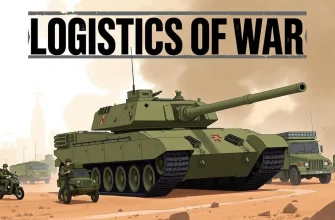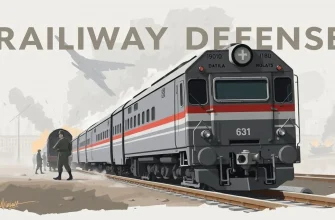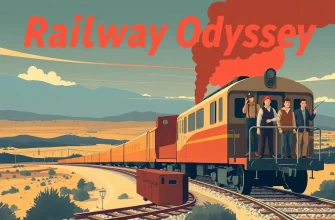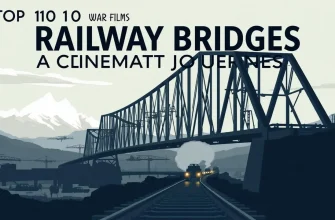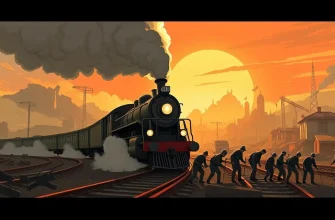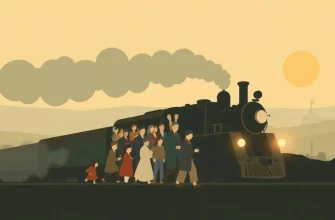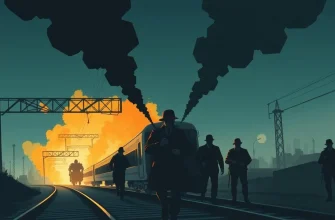Railroads have always been the backbone of industrial development, symbolizing progress and connectivity. These films delve into the often overlooked world of railroad repairs, showcasing the dedication, challenges, and sometimes the sheer human spirit involved in maintaining these vital arteries of transportation. Whether you're a train enthusiast or simply love stories of human endeavor, this curated list of films will take you on a journey through the tracks, highlighting the unsung heroes who keep the world moving.

The Iron Horse (1924)
Description: A silent epic about the building of the first transcontinental railroad in the United States, which indirectly speaks to the ongoing maintenance and expansion of the rail network.
Fact: This film was one of the first to use extensive location shooting for authenticity.
 Watch Now
Watch Now 
The Train (1964)
Description: Set during WWII, this film involves the French Resistance's efforts to prevent a train full of art treasures from reaching Germany, showcasing the strategic importance of railway maintenance and sabotage.
Fact: Burt Lancaster performed many of his own stunts in this film.
 Watch Now
Watch Now 
The Taking of Pelham One Two Three (1974)
Description: This classic film involves a group of hijackers taking control of a New York City subway train. The narrative indirectly touches on the importance of maintaining and securing the rail system, as the city's response to the crisis showcases the infrastructure's vulnerabilities.
Fact: The film was remade in 2009 with Denzel Washington and John Travolta, but the original is often praised for its gritty realism.
 Watch Now
Watch Now 
Silver Streak (1976)
Description: A comedy-thriller where a train journey turns into a series of misadventures, showcasing the train's infrastructure and the importance of maintaining it for safety and functionality.
Fact: The film features Gene Wilder and Richard Pryor in one of their first collaborations.
 Watch Now
Watch Now 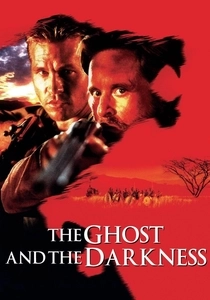
The Ghost and the Darkness (1996)
Description: Set during the construction of the Uganda Railway, this film indirectly deals with the maintenance and protection of the railway line from external threats, like the infamous man-eating lions.
Fact: The lions featured in the film were real and were known as the Tsavo maneaters.
 Watch Now
Watch Now 
Unstoppable (2010)
Description: Although primarily an action thriller, "Unstoppable" features a runaway train scenario that requires the expertise of railroad workers to stop, highlighting the importance of maintenance and quick thinking in railroad operations.
Fact: The film was inspired by the real-life CSX 8888 incident, where a train ran uncontrolled for two hours.
 Watch Now
Watch Now 
The Darjeeling Limited (2007)
Description: Wes Anderson's film about three brothers on a train journey through India, where the train itself becomes a character, highlighting the cultural and logistical aspects of railway maintenance in India.
Fact: The film was shot on location in India, using real trains from the Indian Railways.
 Watch Now
Watch Now 
The Railway Man (2013)
Description: This film follows the true story of Eric Lomax, a British Army officer who was captured by the Japanese during WWII and forced to work on the Burma-Siam Railway. While not directly about repairs, it showcases the aftermath and the emotional repair of a man's life post-war, which is metaphorically akin to repairing the tracks.
Fact: The film was adapted from the memoir of the same name by Eric Lomax, and Colin Firth's performance as Lomax was critically acclaimed.
 Watch Now
Watch Now 
The Great Train Robbery (1963)
Description: While not about repairs, this film focuses on the planning and execution of a heist on a train, which indirectly highlights the security measures and maintenance of the railway system during the Victorian era.
Fact: The film was directed by Michael Crichton, who also wrote the novel on which it was based.
 30 Days Free
30 Days Free 
The Last Train from Madrid (1937)
Description: Set during the Spanish Civil War, this film captures the chaos and the importance of maintaining railway lines for evacuation and military strategy.
Fact: The film was made during the actual conflict, providing a unique historical perspective.
 30 Days Free
30 Days Free 


